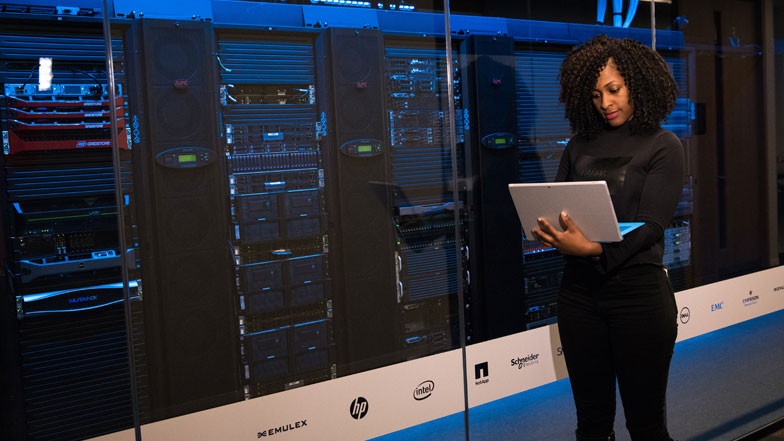
Looking for a career in networking? You should consider Cisco…
If you want to break into the world of technology, there are few qualifications as rewarding as Cisco. However, if the word ‘Cisco’ only makes you think of a certain song from the early 2000s, you’ve got a lot more to learn.
Not sure where to start? Here’s a quick rundown of what you need to know about Cisco:
What is Cisco?
Cisco Systems is a worldwide leader in the field of networking (the technical variety), who aim to transform how people connect, communicate, engage and co-operate with each other.
Their career certifications are industry-leading, and aim to demonstrate a candidate’s ability to program, manage and maintain different types of networks.
What are the different Cisco qualifications?
There are five levels of certification, which are based upon your expertise in different areas of networking. They are:
Entry (CCENT)
Associate (CCNA, CCDA)
Professional (CCNP, CCDP)
Expert (CCDE, CCIE)
Architect (CCAr)
After completing the entry-level qualification (CCENT), you can choose to specialise in any one of the following subject areas: Routing & Switching, Data Centre, Design, Security, Service Provider, Service Provider Operations, Video, Voice and Wireless.
The letters of the acronyms above correspond to the different specialisms.
What do the different Cisco subjects mean?
Routing & Switching – covers the skills required for managing, operating and troubleshooting routing and switching networks. This is the most popular Cisco certification path.
Data Centre – builds and authenticates knowledge of data centre design, equipment installation and maintenance.
Design – covers how to plan, design and build complex systems. Most suitable for those who are interested in how to put systems together.
Security – teaches how to keep networks secure, and how to deal with a variety of security threats. Great for those looking to move into a career as a Security Administrator or Network/Security Specialist.
Service Provider – focuses on the latest in service providing technology, and how to relate these to building and maintaining relevant networks.
Service Provider Operations – builds and validates skills in a troubleshooting environment within carrier class IP NGN network infrastructure.
Video – teaches how to deploy video end-points, set-up new users, and operate networked video solutions.
Voice – validates advanced knowledge and skills required to integrate collaboration and voice applications into network structures.
Wireless – concerned with the design, implementation, security, and operation of wireless networks and mobility infrastructures. Increasingly popular, as wireless networks are fast becoming the standard.
Why do I need Cisco?
Cisco career certifications are amongst the most recognised IT and networking specific qualifications in the world. It is estimated that there are approximately one million active students, in over 165 different countries.
Here are a few of the key benefits of getting qualified:
- You’ll learn key skills to help you break into a career in networking
- You’ll be able to prove your practical skills through an industry recognised certification
- You’ll qualify for a number of networking roles, with many employers considering Cisco certifications a prerequisite
- You could boost your earning potential
- You’ll be able to progress further in your career
How to become a Network Administrator
How much can I earn once qualified?
This will vary depending on individual employer and location. As a general guideline, once CCNA qualified your starting salary should be somewhere around the £25,000 mark.
However, once you’ve reached a good level of experience and progress through the industry, salaries begin to become quite lucrative.
In fact, many at the Expert or Architect level command salaries at six-figure levels.
How much will it cost?
The price of each course varies depending on the level you wish to take. However, prices will usually start at around the £100 level.
What methods of learning are there?
In many cases, this will be completely up to you.
So if you feel online learning offers you the flexibility you’re after or you’re more comfortable in a classroom, you can choose the type of course that suits you best.
However, some exams may have to be taken at an officially recognised examination centre – regardless of your study method.
How long will it take?
The majority of Cisco courses are self-paced, meaning how long they take will largely depend on how much time you can dedicate to the course.
As a basic indication, CCENT qualifications should only take a short time (around 30 hours until completion), although some of the more senior Associate and Expert qualifications can take somewhere closer to 100 hours to complete.
Advantages of becoming Cisco qualified
As the global leader in networking solutions, becoming Cisco qualified will not only lead to greater respect within the industry, it will also lead to a multitude of opportunities for career progression.
Add to this more lucrative salaries and the opportunity to carry on improving your knowledge, and you’ll see why so many people around the world see Cisco certifications as the perfect way to kick-start their career in networking.
Five reasons you should become Cisco qualified right now
Ready to get started? View all Cisco courses now.





